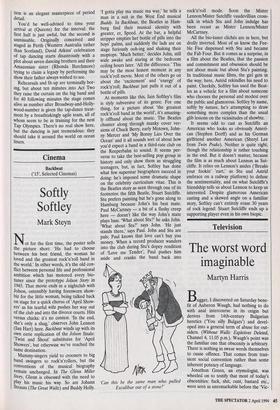Cinema
Backbeat (`15', Selected Cinemas)
Softly Softley
Mark Steyn
Not for the first time, the poster sells the picture short: `He had to choose between his best friend, the woman he loved and the greatest rock'n'roll band in the world.' In other words, it's the old con- flict between personal life and professional ambition which has motored every bio- tuner since the prototype Jolson Story in 1945. That movie ends in a nightclub with Jolson, ostensibly having foresworn show- biz for the little woman, being talked back on stage for a quick chorus of `April Show- ers' as his tearful wife pushes her way out of the club and into the divorce courts. Hits versus chicks: it's no contest. 'In the end, she's only a shag,' observes John Lennon (Ian Hart) here. Backbeat winds up with its own eerie replication of the Jolson finale: `Twist and Shout' substitutes for `April Showers', but otherwise we've reached the same destination.
Mammy-singers yield to crooners to big band swingers to rock'n'rollers, but the conventions of the musical biography remain unchanged. In The Glenn Miller Story, Glenn is obsessed with the need to Play his music his way. So are Johann Strauss (The Great Waltz) and Buddy Holly. `I gotta play ma music ma way,' he tells a man in a suit in the West End musical Buddy. In Backbeat, the Beatles in Ham- burg find their musical identity with greater, er, Speed. At the bar, a helpful stripper empties her bottle of pills into the boys' palms, and suddenly the lads are on stage furiously ooh-ing and shaking their moptops. `Much better,' decides John, still wide awake and staring at the bedroom ceiling hours later. `All the difference.' This may be the most honest moment in any rock'n'roll movie. Most of the others go on about the 'excitement' and 'energy' of rock'n'roll; Backbeat just pulls it out of a bottle of pills. At moments like this, lain Softley's film is slyly subversive of its genre. For one thing, for a picture about 'the greatest rock'n'roll band in the world', it's amazing- ly offhand about the music. The Beatles chunter along through manky cover ver- sions of Chuck Berry, early Motown, John- ny Mercer and 'My Bonny Lies Over the Ocean' and it all sounds sort of about how you'd expect a band in a third-rate club on the Reeperbahn to sound. It seems per- verse to take the best-selling pop group in history and only show them as struggling teenagers, but, in fact, Softley has done what few superstar biographers succeed in doing: he's imposed some dramatic shape on the celebrity curriculum vitae. This is the Beatles story as seen through one of its footnotes: the fifth Beatle, Stuart Sutcliffe. Stu prefers painting but he's gone along to Hamburg because John's his best mate. Paul McCartney — a bit of a fleshy creep here — doesn't like the way John's mate plays bass. 'What about Stu?' he asks John. 'What about Stu?' says John. 'He just stands there,' says Paul. John and Stu are pals; Paul knows that love can't buy you money. When a record producer wanders into the club during Stu's dopey rendition of 'Love me Tender', Paul pushes him aside and cranks the band back into Can this be the same man who pulled Excalibur out of a stone?' rock'n'roll mode. Soon the Mister Lennon/Mister Sutcliffe vaudevillian cross- talk in which Stu and John indulge has been recast as Mister Lennon/Mister McCartney.
All the bio-tuner clichés are in here, but drolly inverted. Most of us know the Fee- ble Five dispensed with Stu and became the Fab Four. But it comes as a surprise, in a film about the Beatles, that the passion and commitment and obsession should be not about music but about Stu's painting. In traditional music films, the girl gets in the way; here, Astrid rekindles his need to paint. Cheekily, Softley has used the Beat- les as a vehicle for a film about someone who chooses the personal and modest over the public and glamorous. Softley by name, softly by nature, he's attempting to draw something more complex than the usual glib lessons on the vicissitudes of showbiz.
It seems odd to cast as Sutcliffe an American who looks so obviously Ameri- can (Stephen Dorff) and as his German girlfriend another American (Sheryl Lee from Twin Peaks). Neither is quite right, though the relationship is rather touching in the end. But it doesn't matter, because the film is as much about Lennon as Sut- cliffe. It relies on Lennon's asides ('Breaks your fookin"eart,' as Stu and Astrid embrace on a railway platform) to defuse the sentimentality, and on what Sutcliffe's friendship tells us about Lennon to keep us interested. Despite glamorous American casting and a skewed angle on a familiar story, Softley can't entirely erase 30 years of rock legend: Stuart Sutcliffe ends up a supporting player even in his own biopic.


























































 Previous page
Previous page